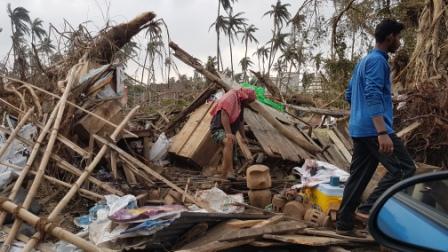Bhubaneswar: At a time when the state government is boasting about its achievements in providing timely relief to the victims of cyclone Fani in the affected areas of Odisha especially Puri, ground realities begged to differ.
An interaction with the communities affected by the cyclone after one month of the natural disaster revealed that many continued to suffer due to the shoddy planning of the policy-makers. The bureaucrats failed to keep the ground realities in mind.
Issues ranging from shorter and low quality polythene sheets, uncooked food at shelter homes, discrimination in providing relief, insufficient compensation marred the whole relief operations post Fani. Kanti Swain, a resident of Penthakata claimed that the government literally cheated them by attracting people to shelter homes promising cooked food and delivering only dry beaten rice as soon as they shifted.
“We stayed at the shelter home at Penthakata close to the sea beach of Puri. The building was earlier used to store EVM machines. A day before cyclone we were promised cooked rice and dalma. Many were asked to shift for safety and assurances of food, water and shelter were given but since the day of the cyclone we started getting only dry beaten rice,” he said.
Many, he said, left the shelter house and opted to stay on the beach or in the open in Puri city as their houses were damaged and the support vanished from the shelter homes and people staying there were left to suffer. Similar was the fate of the population in rural areas in Puri district who were given plastic sheets to protect them from rains, sunlight and help them cover their houses, many of which were small one-room kuccha houses.
Villagers from the Satyabadi and Bramhagiri said that many of the got a single polythene sheet from the government which did not help them much as there was need to cover humans, cattle and food grains. Many also complained about the quality of the polythene sheets as experts working on the ground demanded tarpaulin sheets to assist in relief works.
Some experts also claimed that the relief works also deprived the women from their rights. Sneha Mishra, Secretary Aaina and a member of Civil Society Responds to Fani (CSRF), said as all public places with proper roofs (such as community halls, mandaps, temples etc.) were found to be occupied by men, women had to spend the daytime under scorching sun or under makeshift shelters. This was the situation in several villages under Kushbenti panchayat of Brahmagiri block.
“In Brahamania village of Satapada, farmers have already sold 6 truck-loads of paddy at a distress rate of about Rs 1,355 per quintal against the MSP of Rs 1,750 per quintal. The farmers have already lost about Rs 6.30 Lakh because of this at Rs 1.05 Lakh per truck, i.e. Rs 395 per quintal,” said Manas Mishra, Executive Director of Vasundhara, an NGO working on tribal rights.
Forgotten Census
The Union government says that the “Indian Census is the largest single source of various statistical information on various characteristics...
Read more





































